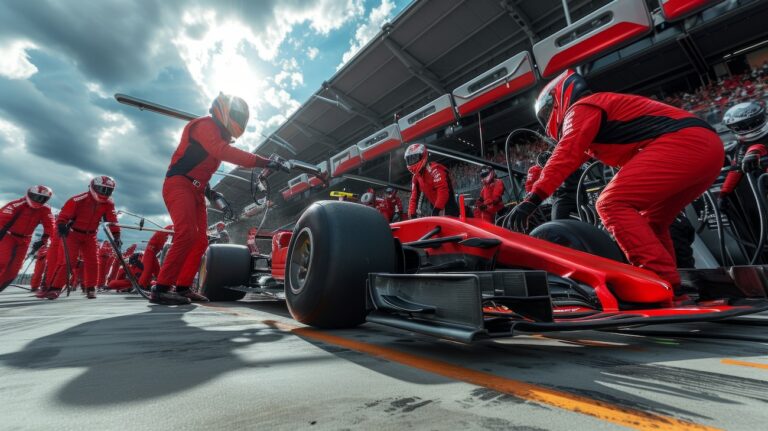With the exciting British Grand Prix just behind us and the Hungary Grand Prix just around the corner, Pierre Berlin, General Manager of EMEA at monday.com, provides some insight on the lessons SME leaders can learn from a well oiled F1 pitstop team.
As Formula One stars like Max Verstappen, Charles Leclerc, and Lando Norris compete on the track, a key part of  their success is attributed to the pitstop crews supporting them. It’s no secret that a well-oiled pitstop team can be the deciding factor in winning races.
their success is attributed to the pitstop crews supporting them. It’s no secret that a well-oiled pitstop team can be the deciding factor in winning races.
A pitstop is a highly coordinated activity that depends on seamless teamwork, absolute trust, and continuous improvement, much like the daily environment of driving a small business forward. With stakes just as high, small business owners can learn from pitstop teams about meticulous strategy planning, team optimisation, and solid collaboration.
By embracing a pitstop mindset throughout their organisations, small business leaders can propel their companies forward and outmanoeuvre the competition.
Supercharging Strategic Planning
A successful F1 pitstop requires every team member to know their role and execute tasks simultaneously, which is only possible with a clear vision that everyone in the team embraces. For the pitstop crew, the goal is to get their driver across the finish line in the fastest time possible.
While the company vision may be clear to a business leader, it is crucial that the entire team understands this vision just as well. Linking individuals’ OKRs (Objectives and Key Results) directly to the company’s goals is key to maintaining engagement and ensuring that everyone in the business aligns with the overall company direction.
Thriving in a high-pressure environment also requires meticulous scenario planning for all possible outcomes. Amid wider economic uncertainty, business leaders must explore various potential business trajectories. Role-playing exercises, crisis management drills, and strategic planning sessions are crucial to keep teams working collaboratively in new scenarios. By planning and preparing for multiple scenarios, teams can confidently adapt to changing market conditions.
Driving Team Performance
Pitstops that previously took over 30 seconds now are completed in under two seconds, demonstrating teams’ continuous pursuit of performance optimization. Similarly, investing in team training and leveraging technological advancements can yield significant efficiencies for small businesses.
Investing in team training is, therefore, paramount to success. As well as ensuring that individuals are well equipped to do their current job well, offering training that boosts their broader skills will ensure they are in the best position to deal with new challenges. Training should be integral to scaling the business.
Regular evaluations are also key to making long-term, incremental changes. Following every race, pitstop crews conduct a post-mortem to evaluate what went well and what needs improvement. Small businesses should do the same after delivering a milestone project to extract key learnings. Establishing a culture of open feedback where team members at all levels feel confident sharing their experiences is vital.
Greater access to team data through a smart tech stack is also vital for finding efficiencies, while freeing up time from heavy administrative tasks. A robust tech stack should include intuitive, interoperable tools that allow teams to work dynamically from a single source of truth. This will enable teams to make more strategic adjustments.
Taking Control of the Wheel
A pitstop is always managed by one individual whose role it is to ensure the team is firing on all cylinders and takes charge in times of crisis. Small business leaders need to provide the right level of support to set their teams up for success and know when to intervene during more challenging moments.
By listening to team feedback and leveraging real-time data, small business leaders can take a more holistic approach that provides clarity during times of uncertainty. In high-pressure situations, leading with calmness and precision is key to the team’s overall success.
Just like a high-pressure pitstop, small business leaders need to foster an environment of collaboration and trust. By creating a culture where everyone in the team can offer honest feedback, backed up by data insights, small business leaders can drive their team to pole position.

